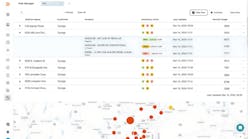Still more regulations are coming from the Obama Administration. This time the spotlight is on the food transportation and distribution process.
Regulations now under consideration will have a direct impact on the trucking industry, including tank truck fleets that haul fluid milk, sweeteners, vegetable oil, flour, and a host of other products. The federal regulatory activity is almost certain to bring higher operating costs for carriers that are already working with tight profit margins.
The latest regulatory round was launched when the Health and Human Services Department's Food and Drug Administration (FDA) published an advance notice of proposed rulemaking (ANPRM) in the April 30 Federal Register. That is the first step in developing specific regulations to govern the transport of food and food additives by truck and rail.
FDA officials make it clear in the ANPRM that they are absolutely determined to issue regulations covering sanitary transportation practices to be followed by shippers, carriers, receivers, and others involved in food transport. The only real discussion concerns the breadth and scope of the regulations.
Food safety and security has gotten significantly more attention under the Obama Administration, and the trend seems almost certain to continue. Legislative and regulatory actions are bringing higher fees and operating costs. More of this is almost certainly on the way for the entire food industry supply chain.
In fact, Margaret Hamburg, FDA administrator, said recently that the agency simply does not have enough regulatory control over the food industry at this time. The agency needs more authority to control the food industry and hold accountable the companies involved in that industry.
Food transporters also have faced a constant blizzard of regulations from other federal agencies since the beginning of 2009. The Environmental Protection Agency claims that a Supreme Court ruling stating that EPA has regulatory control over carbon dioxide emissions applies to all regulated pollutants.
A Heritage Foundation report in April pointed out that global warming legislation would greatly burden the agricultural sector (as well as the transportation sector that serves agriculture). Cap-and-trade bills would impose a massive tax on energy. There are indications that Congress will try to force through cap-and-trade in a lame duck session if Democrats lose control of the House of Representatives, Senate, or both.
At the Department of Labor, existing regulations and laws are being used to achieve what the unions had hoped to accomplish with the card check unionizing effort. In addition, DOL officials are focused on vigorous enforcement of worksite regulations that could bring massive fines and even criminal prosecution and jail time for jobsite infractions. Other federal agencies are pursuing the same strategy as part of an unrelenting assault on small businesses.
It is beginning to appear that regulations are the only thing coming out of Washington DC. In fact, the 2011 federal budget calls for more than $59 billion to be devoted to developing and enforcing federal regulations. That is 4.1% more than was appropriated for this year.
Fletcher R Hall, F R Hall & Associates and publisher of Farm to Fork sums it up well: “These projections (for new regulations) and the increased demands of the actual implemented regulations bring ominous signs for the agriculture, trucking, and food production sectors of our economy. Already heavily regulated, these sectors face potential additional regulations in the areas of climate control, food safety, and transportation safety that will assuredly lead to higher consumer prices and thinner corporate profit margins.”
The Obama Administration needs to understand that without food America starves. Without trucks, America stops. It's that simple.
Agree or disagree? Make your voice heard by visiting Bulk Transporter Interactive at bulktransporter.com and clicking on “Contact Us.”








